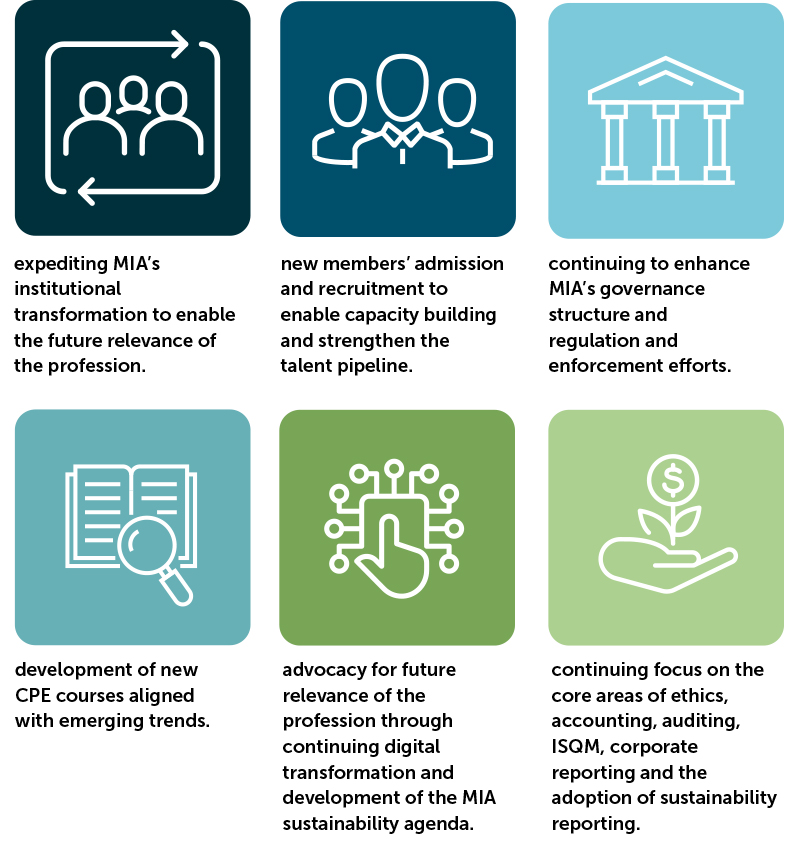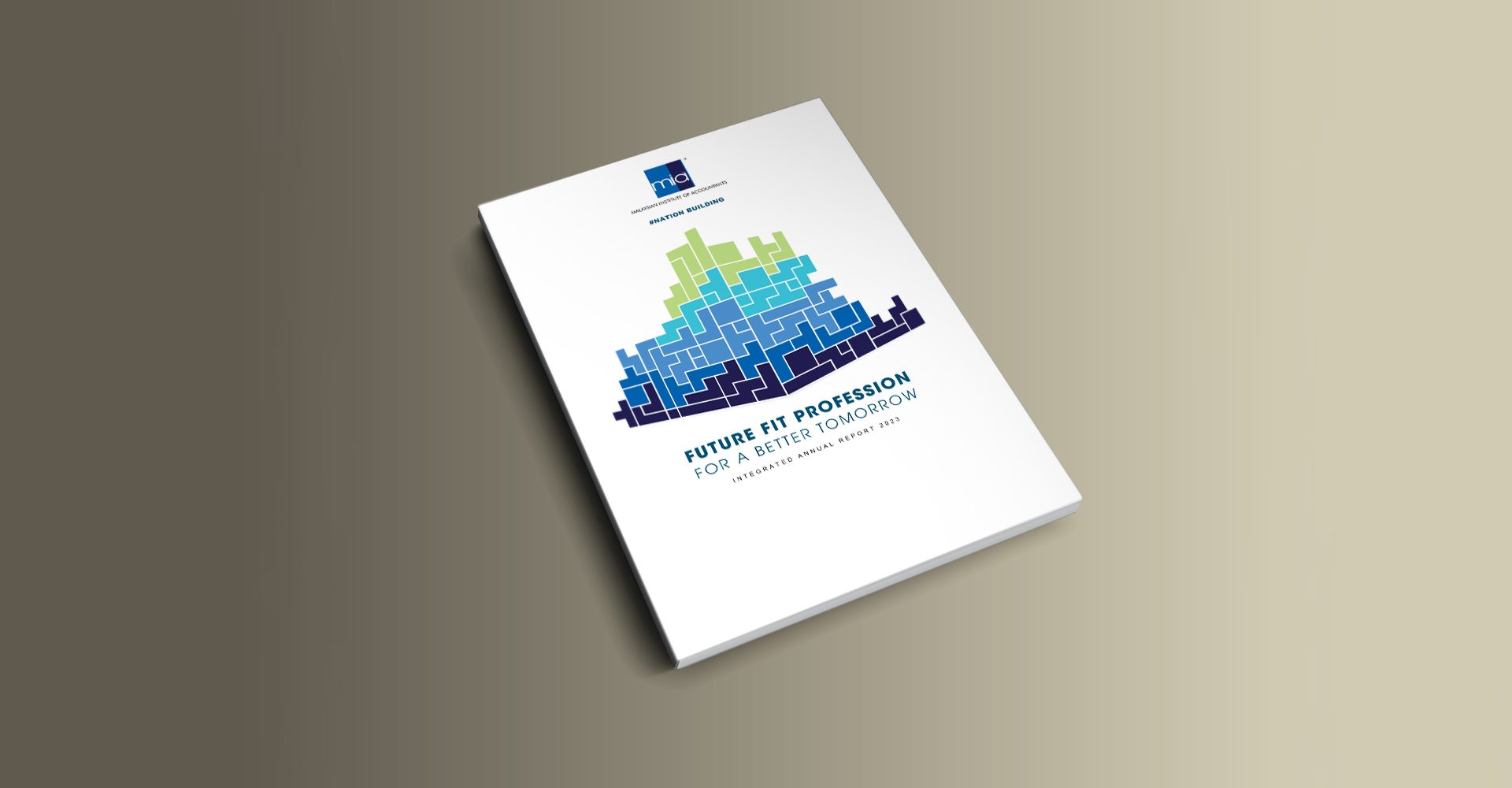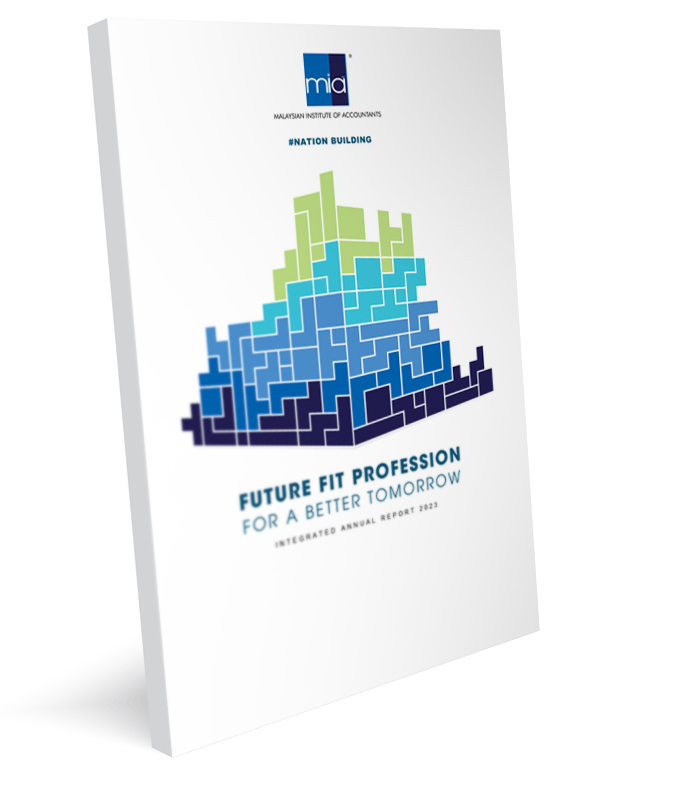The Malaysian Institute of Accountants (MIA) is pleased to present the latest MIA Integrated Annual Report (IAR) 2023, themed Future Fit Profession for a Better Tomorrow.
Prepared in accordance with the Integrated Reporting Framework of the IFRS Foundation, the IAR succinctly narrates MIA’s efforts to regulate and develop the profession in order to future-proof accountants, ensure the future relevance of the profession, and support sustainable nation building.
The strategic collaboration approach is the basis of MIA’s value creation activities. As such, the IAR demonstrates how MIA continues to strengthen strategic collaborations with our diverse and extensive stakeholders in the key focus areas of regulation and enforcement; capacity and competency building; enhancement of audit quality, business continuity and economic resilience; digital transformation of the profession; ethics and good governance, and ESG and sustainability, among others.
The following are some highlights of the IAR 2023:
President’s Message
Datuk Bazlan Osman discusses MIA’s efforts to strengthen the future relevance of the profession for the financial year under review and for the year to come. Key highlights of his message include his overview of MIA’s initiatives in the context of strengthening governance, developing competency and strengthening the talent pipeline, enhancing the profession’s value proposition, embedding ethics and developing the two-pronged sustainability agenda.
CEO’s Message
Dr Wan Ahmad Rudirman Wan Razak shares his insights on the key highlights of the Institute’s operational performance for FY2022/2023 and its future prospects. In his message, Dr. Wan also touches on the Institute’s key strategic focus areas for Fy2023/2024, which include:

Special Focus – Sustainability Agenda
This section discusses the development of the MIA sustainability agenda, which is a two-pronged approach that advocates sustainability for the accountancy profession and the Institute respectively.
Among the areas the MIA sustainability agenda will focus on are governance, ethics, accounting, people, reporting, process, assurance, systems, regulation and guidance. These are fundamental areas relevant to the accountancy profession and the Institute whereby the sustainability agenda needs to be mapped and addressed.
MIA has established the Sustainability Department which is part of the Sustainability, Digital Economy and Reporting (SDER) Division to manage the MIA sustainability agenda. The MIA Council has also established the Sustainability Blueprint Task Force to oversee the development of the MIA Sustainability Blueprint for the accountancy profession. Simultaneously, the MIA Sustainability Framework and Targets are being developed which outline the sustainability agenda for the Institute.
Case Study – Advocating Ethics in the Public Interest
Ethics is fundamental to public trust in the conduct of professional accountants and it must always be the basis of their judgments, decisions, and actions when performing professional activities or services.
As the regulator of the profession, MIA emphasises the importance of ethical behaviour and enforces compliance with the MIA By-Laws (On Professional Ethics, Conduct and Practice) of which Part A is substantially based on the International Code of Ethics for Professional Accountants established by the International Ethics Standards Board for Accountants (IESBA).
This section discusses MIA’s strategy and initiatives to strengthen ethical behaviour, including thought leadership, outreach programmes, education, webinars, quizzes and issued Ethical Guidelines on Technology Usage for Public Practitioners.
In addition to these, the IAR 2023 presents MIA’s overview of its extensive stakeholder engagements and strategic collaborations, material matters, risks and how these impact our business model, capitals and performance as measured against our four strategic objectives and the key UNSDGs, as well as other information that can help stakeholders to better understand MIA’s strategy, decision-making and outcomes.
Click here to read the full report.








